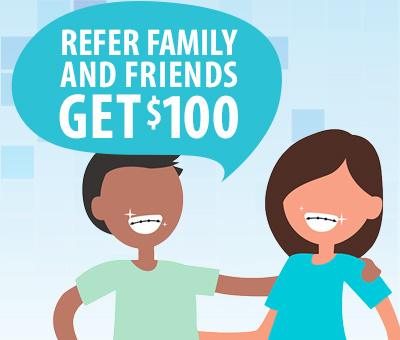
The thought of getting braces can bring up a lot of emotions for kids and teens. Some might be looking forward to getting the smile of their dreams. Others might be embarrassed to show off their new hardware. At our orthodontic clinics in Langley, Surrey and Abbotsford, it’s usually the fear of the unknown that makes kids and teens nervous about getting braces or Invisalign. They’re probably asking themselves questions like: What will I look like with braces? Will my braces or Invisalign hurt? Will I be the only one of my friends who has to have braces? The anticipation of getting braces or Invisalign is often more stressful than the treatment itself!
As the Fraser Valley’s premier orthodontists, the doctors at Aura Orthodontics are here to help kids (and their parents) adapt to life with braces or Invisalign. We’ll give you and your kids all the information you need about what to expect from treatment, how to care for braces or Invisalign, and why your kids should be excited to watch their new smile develop before their eyes. Having trouble getting your kids excited about braces or Invisalign? Here are a few helpful tips to ease any anxiety and make the process as smooth as possible.
Table of Contents
1. Educate Yourself (And Your Child) on Life with Braces
The best way to set your kids up for success with braces or Invisalign is to learn as much as you can about how their lives will change. Better yet, educate yourself well before they actually begin treatment. When your kids have a solid understanding of what to expect from their braces or Invisalign treatment, they’ll be more comfortable about transitioning into their new life, rather than feeling apprehensive about it. The better educated you are as a parent about the braces or Invisalign experience, the better your kids will feel. Do your research and then discuss your findings with your child or teen. If you have any questions, we’re just a phone call away and happy to provide more information.
2. Show Them Orthodontic Treatment is Totally Normal
One of the biggest sticking points with kids and teens about orthodontic treatments is that they’ll be the only person they know with braces. They might also be feeling self-conscious about how their appearance will change. The best way to alleviate this kind of anxiety is to prove to your kids how common braces and Invisalign are. If they have any friends, classmates or siblings who have had braces, point out their success with treatment. If you yourself had braces, share your own positive experience. You could also show them photos of celebrities who wore braces. Some of Hollywood’s biggest names — like Emma Watson, Angelina Jolie and Tom Cruise — have all had braces, even when they were in the spotlight. Letting your kids know they’re not alone will make it easier for them to relax and maybe even enjoy their braces or Invisalign treatment.
3. Stock the Fridge with Braces-Friendly Food
Adjusting to life with braces can be tough, especially for kids who might not be used to big life changes. In addition to seeing a new smile in the mirror, they also have to learn what they can and cannot eat. As parents, you can make the process easier by making sure the kitchen is stocked with braces-friendly food. Instead of packing sandwiches in their lunchboxes (bread can get stuck in braces), include easy-to-eat foods like soups, hard boiled eggs, steamed vegetables or yogurt. At home, make braces-friendly meals for the whole family so your kids don’t feel singled out. Bonus: most foods that are safe for braces are super nutritious! By eating braces-friendly food as a family, your child or teen will never feel like they’re missing out.
4. Use Positive Reinforcement to Reward Good Braces Behaviour
Just like your kids will need to get used to eating differently, they’ll also need to develop new habits to take care of their braces. They’ll need to be more diligent about brushing and flossing their teeth, and if they have Invisalign, they’ll need to clean their aligners properly. Offering positive reinforcement when they practice good oral hygiene will encourage the behaviour, making their treatment more effective and protecting your investment in their braces or Invisalign. It can help to continuously remind them to stay focused on the outcome: their perfect smile. Having an end goal to work towards will make it easier for them to stay on track.
5. Be Prepared to Help Them Handle Soreness
Braces and Invisalign are both extremely effective orthodontic treatments to create beautiful smiles. But in order to achieve optimal alignment, your teeth have to move which, unfortunately, can hurt. As your child’s braces or Invisalign aligners shift their teeth into the proper position, it can be uncomfortable to deal with. Additionally, your child’s brackets can be sharp and irritating to the lips at first. To help your kids cope with the not-so-fun parts of straightening their teeth, have child-safe painkillers (like ibuprofen) and plenty of orthodontic wax on hand. Have them take Advil right before getting their braces tightened or when they switch to a new set of aligners. If their brackets are scraping the inside of their lips, place wax on the sharp parts of their braces to reduce irritation. It’s important to be proactive about managing discomfort in order to support your kids’ journey through orthodontic treatment.
6. Show Them the Value of Braces
If your kids are feeling wary about how braces will impact their lives, try to help them see the bigger picture instead of focusing on what’s happening right now. Not only will they have a brand new smile to show off — they’ll experience a boost in confidence and self-esteem as a result. Some short-term discomfort now will lead to long-term improvement in their lives. Keeping your kids focused on the outcome will help them understand the lifelong value of braces or Invisalign.
Adapting to change and creating new habits can be a challenge for anyone. As your kids adjust to their new lives with braces, it’s up to you to give them the support and tools to take care of their teeth. Braces and Invisalign are an investment in your child’s future, so talk to them about how fortunate they are to have the opportunity to achieve their ideal smile. To combat fear or nerves, help them understand what it will be like to have braces or Invisalign ahead of their appointment. When they feel more prepared ahead of time, they’ll be able to look forward to the outcome of their treatment. And when you’re there to help them every step of the way, they’ll be more likely to take a proactive role in their dental health for now and in the future.





